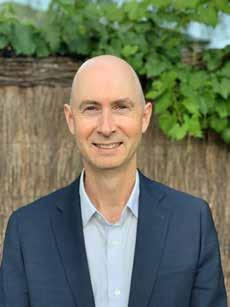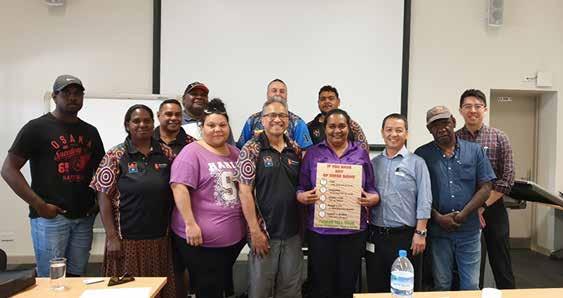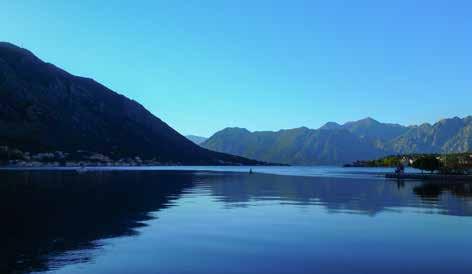
4 minute read
RANZCR: Congratulations to Dr Scott Carruthers
Inaugural Recipient of the FRO Indigenous Health Prize
In 2020, the College launched the Faculty of Radiation Oncology (FRO) Indigenous Health Prize to promote research that increases awareness and understanding of Indigenous Health issues in cancer care. The prize is awarded in the event of high-quality research in Indigenous Health being published in a peer-reviewed journal.
The inaugural recipient of the prize was Dr Scott Carruthers, for his research that was published in the Journal of Medical Imaging and Radiation Oncology (JMIRO) “Measuring (and narrowing) the gap: the experience with attendance of Indigenous cancer patients for Radiation Therapy in the Northern Territory.”
Dr Carruthers is a radiation oncologist at the Royal Adelaide Hospital and Icon Cancer Centre. He completed his MBBS at the University of Adelaide and completed specialist oncology training in Adelaide, with postgraduate training in Melbourne and Edinburgh, United Kingdom. Dr Carruthers became a Fellow of the College in 1996.
Through a directorship with Northern Territory Radiation Oncology, Dr Carruthers has had an ongoing support role with cancer care in the Northern Territory since 2010. Below he writes about his experience of Indigenous Health in cancer care, and the publication that received the 2020 FRO Indigenous Health Prize.
"Thank you to the College for encouraging research with this annual prize.
Since 2010, Northern Territory Radiation Oncology (NTRO), based in Darwin, has provided radiation oncology services for Northern Territory patients at Alan Walker Cancer Care Centre (AWCCC), Royal Darwin Hospital.
Within the Northern Territory demographics, a sizeable proportion of patients are classed as Indigenous, either from urban or regional/remote locations.
In 2011, the NTRO clinical team conducted a small initial analysis of attendance of Indigenous patients, and was published with Dr Hien Le, senior registrar as lead author. This analysis found no difference between Indigenous and non-Indigenous patients in their levels of engagement, but its more limited scope didn’t analyse for treatment interruptions or breaks.
Despite finding no apparent difference, NTRO undertook measures to improve the support for Indigenous patients, such as Indigenous liaison officers, and education programs such as CEPO (Clinical Experience Program in Oncology) in 2012, providing teaching for rural and remote Aboriginal health practitioners (AHP) to enable them to deliver improved support for their cancer patients.
The research published in JMIRO in 2019, “Measuring (and narrowing) the gap: the experience with attendance of Indigenous cancer patients for Radiation Therapy in the Northern Territory”, was largely due to the tireless effort of senior radiation therapist, Mary Pennefather, who prospectively collected the data. It is an analysis of five years of attendance, both pre-radiation therapy and during radiation therapy (RT), from the commencement of the service, including all referred Indigenous patients, numbering in excess of 400.
This was compared to just over 400 nonIndigenous patients over the same five year period, matched by including one in every four patients chronologically as their referral was received, with the finding of a significant difference in attendance for Indigenous patients, both prior to and during their radiation therapy course.
Attendance during radiation therapy over the five years showed significant improvement over time for Indigenous patients from 70 per cent to 81 per cent, although pre-RT attendance did not improve over time. We found no significant difference in RT attendance between urban and regional/remote patients, although favouring slightly better attendance for urban Indigenous patients.
Examples of recent and ongoing programs include:
1. AHP Cancer Care Workshops, which are accredited as a Certificate IV program, with participants involved in a week of theory, including three days of clinical experience. Key stakeholders from the NT Cancer Care Network, Primary Care, NGOs and Aboriginal Health Organisations have been involved in the development of the program. This is supported by funding from the Northern Territory Public Health Network.
2. Cancer care education to final year AHPs at the Batchelor Institute, including clinical experience provided by NTRO at AWCCC. 3. Borroloola Aboriginal Cancer Navigation Project (2020 to 2022), funded by MacArthur River Mines Benefit Trust, which is a follow-up initiative from the AHP training program conducted by NTRO at AWCCC. Future research will aim to look at further trends over time and assess these hopefully successful interventions. The FRO Indigenous Health Prize money will certainly help to meet the costs of future statistical analysis."
Dr Scott Carruther’s ResearchGate profile: www.researchgate.net/profile/ Scott_Carruthers

Cancer Education at Batchelor Institute: Aboriginal Health Practitioners with Peter Nguyen, Radiation Oncology Registrar, and Giam Kar, NTRO director.
Are you involved in Indigenous Health research in cancer care? The FRO Indigenous Health Prize offers AU$2,000 for Indigenous Health research that has been published in a peer-reviewed journal. Applications for the 2021 prize are open until 12 April 2021.
For more information on this prize, as well as other research prizes and grants the College offers, visit the website: www.ranzcr.com/ college/grants-and-awards










